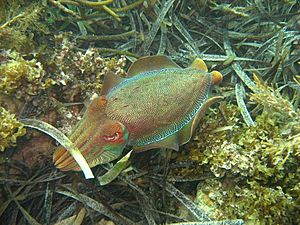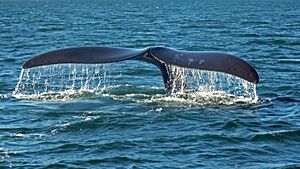Point Lowly facts for kids
Quick facts for kids Point LowlyWhyalla, South Australia |
|||||||||||||||
|---|---|---|---|---|---|---|---|---|---|---|---|---|---|---|---|
| Postcode(s) | 5600 | ||||||||||||||
| Time zone | ACST (UTC+9:30) | ||||||||||||||
| • Summer (DST) | ACDT (UTC+10:30) | ||||||||||||||
| LGA(s) | City of Whyalla | ||||||||||||||
| State electorate(s) | Giles | ||||||||||||||
| Federal Division(s) | Grey | ||||||||||||||
|
|||||||||||||||


Point Lowly is a small piece of land that sticks out into the sea, located north-east of Whyalla in South Australia. This area is used for many things. It has places for defence, factories, homes, fun activities, and tourism.
Port Bonython is nearby to the north-west. This area might grow with more factories in the future. This is because the State's mining industry is expected to get bigger. The most famous things about Point Lowly are its old Point Lowly Lighthouse and the huge gathering of Australian giant cuttlefish that happens every winter.
Point Lowly was named by explorer Matthew Flinders in 1802. Another explorer, Nicolas Baudin, from France, gave it the name Cap Lafontaine around the same time.
There is a boat ramp north of the lighthouse. It is used by businesses that farm seafood and by people who enjoy boating. The waters near Point Lowly are popular for catching snapper fish. However, fishing for snapper is not allowed in South Australia from November 1st to December 15th.
Contents
Amazing Wildlife at Point Lowly
Point Lowly is home to some incredible marine life. Many people love to visit, especially in winter, to see the giant Australian cuttlefish.
Giant Cuttlefish Gathering
Every winter, thousands of giant Australian cuttlefish come together near Point Lowly. They gather here to breed. Diving and snorkelling to see them is a very popular activity.
Sadly, the number of cuttlefish in the Northern Spencer Gulf has been going down for over ten years. This decline is a big worry for people locally and around the world. Experts are studying why this is happening.
Whale Sightings
Sometimes, you can spot large whales from Point Lowly during the winter. Southern right whales and humpback whales are known to visit these waters. It's an amazing sight to see these huge animals in their natural home.
Future Plans for the Area
The government of South Australia has plans to develop a large part of the Point Lowly area. This project is called the Port Bonython Minerals Precinct.
Planned Developments
The plans include:
- An iron ore export port, which is a place to ship iron ore.
- A seawater desalination plant. This plant would turn salty ocean water into fresh water for a company called BHP.
- Port Bonython Fuels, a place to store and distribute fuel. This is owned by Mitsubishi.
As of July 2015, the Port Bonython Fuels hub was being built. The desalination plant has been put on hold for now. The iron ore export wharf still needs special environmental approvals from the government.
Community Concerns
These plans for new industries near Point Lowly have caused some concern. Several community groups from nearby Whyalla are against them. These groups include Save Point Lowly, the Cuttlefish Coast Coalition, and the Alternative Port Working Party.
They are worried that all these new developments could harm the environment. They also fear it might stop other people from using the area for fun or tourism.
How Point Lowly Became Accessible
Point Lowly first became easy to reach by road from Whyalla in 1948. Before that, there was only a very rough path. In the late 1940s, people were allowed to build small holiday homes, called shacks, in the area.
Who Uses Point Lowly?
Many different groups and people use the Point Lowly peninsula. These include:
- The Australian Defence Force for training.
- Santos Limited, which operates a processing plant for oil and gas.
- Clean Seas Seafood, which used to farm fish here and plans to start again.
- Port Bonython Fuels, a place for diesel fuel distribution.
- People who own homes along the coast.
- Indigenous Australians, who have a long history with the land.
- Tourists and campers who visit for holidays.
- Fishers who come to catch fish.
- Scuba divers and snorkelers who explore the underwater world.
 | Aaron Henry |
 | T. R. M. Howard |
 | Jesse Jackson |


